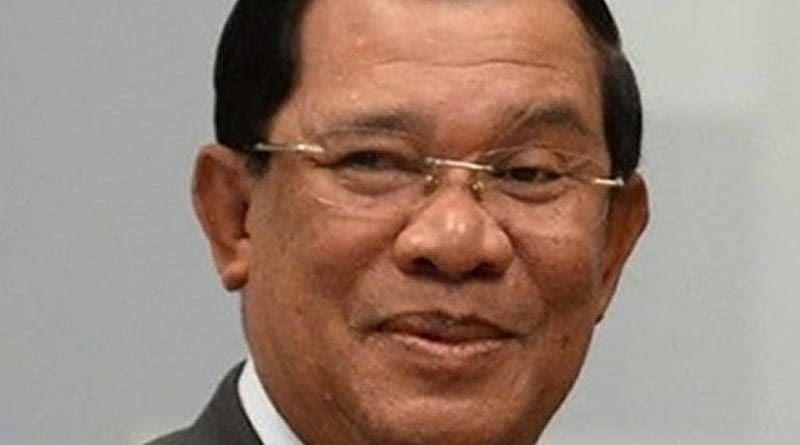Cambodia: Opposition Party Threatened With Dissolution
The Cambodian government’s filing of a politically motivated legal case on October 6, 2017 to dissolve the main opposition party will render national elections in July 2018 undemocratic, Human Rights Watch said. If the government-controlled Supreme Court rules against the Cambodia National Rescue Party (CNRP), this would deny Cambodians the fundamental right to elect a government of their choosing.
In recent months, the government of Prime Minister Hun Sen has engaged in an intensified crackdown against the country’s political opposition, the independent media, and human rights groups. Last month, the government arrested CNRP leader Kem Sokha on dubious charges of treason and threatened to arrest other senior party members. It forced the closure of the Cambodia Daily, independent local radio stations, and FM stations that re-broadcast Radio Free Asia and Voice of America’s Khmer language service.
“The Cambodian government’s lawsuit to dissolve the main opposition party ahead of the 2018 elections is a naked grab for total power,” said James Ross, legal and policy director. “Governments that still insist Cambodia is democratically ruled should act to reverse this development, or share the blame for democracy’s demise under Hun Sen’s autocratic rule.”
At least 20 of the approximately 36 opposition and civil society activists arbitrarily arrested since July 2015 remain imprisoned; many of them were prosecuted in summary trials that fell far short of international standards.
The current crackdown appears motivated by the ruling Cambodian People’s Party’s (CPP) concerns about winning national elections scheduled for July 29, 2018. The CNRP made significant electoral gains during both the 2013 national elections and the June 2017 commune elections.
On February 20, the CPP adopted amendments to the Law on Political Parties that severely undermine the ability of opposition parties to function. Article 38 of the law provides the minister of interior with the authority to “file a complaint to the Supreme Court to dissolve that political party in case of committing a serious offence.” A new provision, article 18, sets out that senior members of a political party “shall not be a person convicted of a misdemeanor or a felony without having their sentence suspended.”
Sam Rainsy, the founding president of the CNRP, had to step down from his party’s leadership because of a criminal conviction in a politically motivated defamation case from 2013, in order to avoid giving the government grounds to dissolve the party. Rainsy is currently in exile and faces at least two years in prison were he to return to Cambodia.
On September 3, the government arrested Kem Sokha, who became the CNRP’s leader after Rainsy’s resignation. Kem Sokha had been subject to de facto house arrest at CNRP headquarters in Phnom Penh for six months in 2016 in a separate politically motivated case. Since his arrest, as many as half of the CNRP’s national members of parliament, as well as senior party staff, have fled the country.
Several other elected opposition leaders, including MP Um Sam An, Senator Hong Sok Hour, Senator Thak Lany, and Commune Councilor Seang Chet, remain in detention after politically motivated prosecutions.
The international community played an important role in supporting Cambodia to reach a peace agreement in Paris in 1991 in the wake of the 1975-79 Khmer Rouge genocide and the Vietnamese occupation and civil war. The Cambodian signatories to that deal, including Hun Sen, agreed to “ensure respect for and observance of human rights and fundamental freedoms in Cambodia” and “support the right of all Cambodian citizens to undertake activities which would promote and protect human rights and fundamental freedoms.” Key government donors involved with Cambodia – including the United States, Japan, European Union countries, and Indonesia, among others – signed the deal as guarantors and agreed “to promote and encourage respect for and observance of human rights and fundamental freedoms in Cambodia.”
Paris signatories and other concerned countries should respond robustly to this political crackdown, starting with diplomatic moves to threaten targeted economic sanctions and travel bans on senior Cambodian officials involved in the crackdown, including Hun Sen. They should call on Hun Sen to end all politically motivated cases against opposition leaders, civil society activists, and media outlets, and allow the democratic process to proceed with full respect for fundamental rights and liberties.
“Hun Sen’s latest crackdown could be the final nail in the coffin of the Paris Peace Agreements,” Ross said. “With national elections eight months away, the countries that struggled to obtain that agreement, which enshrines respect for human rights and democracy in Cambodia, should urgently act to save it.”

